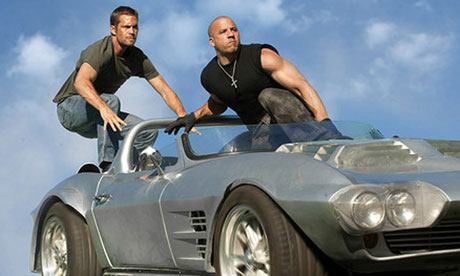
What's happening? Paul Walker and Vin Diesel in Fast Five. Photograph: Universal Pictures
This is my favourite promotional photograph of recent years. Yeah boy! So what exactly is happening at this juncture of Fast Five, instalment numéro cinco of The Fast and the Furious (F&F) franchise? Paul Walker and Vin Diesel are both crouched low in the internationally recognised pose of shit's-going-down, but beyond that, who knows? Is Paul landing, or about to take off? Is Vin driving with his foot and, if so, is that legal? Is the car even moving? They look serious, atop their modified 1963 Corvette Grand Sport, like they're anticipating imminent delivery of a piece of heavy furniture. Whatever, don't sweat it; that's just how these guys roll.
You know you're going to get certain things from an F&F movie, and Juliette Binoche isn't one of them. Bombastic street-racing scenes filmed in juddering Shakycam like it's footage of a space shuttle exiting the upper atmosphere. Scantily clad women draping themselves over high-performance vehicles, as daydreamed by the tooth-grilled love child of Ali G and Jeremy Clarkson. The F&F franchise is cinema's equivalent of those dodgy Urban Flava-type music compilations – brash, festively obvious, ruthlessly demographicked, impossible not to find yourself nodding along to at some point. I'm completely hooked.
They're reprehensible films in many ways. The petrolhead thing isn't exactly in tune with the times; it feels as if, film after film, Vin and Paul have been essentially unzipping the flies on their Evisus and copiously relieving themselves all over Lord Stern. And however much Michelle Rodriguez's stink eye is deployed to bolster the series' girl power, the sexual politics remain, let's say, problematically booty-centric. Oneleading female Hollywood producer recently told me F&F was her own guilty pleasure. This has only partially stifled my qualms over lapping up a franchise that ushers in its centrepiece romance to the dulcet strains ofLudacris's Area Codes.
I get where that producer is coming from, though. They're well-made films, and they do whatever it takes to get the audience in the zone. Building on the solid if workmanlike chassis of the 2001 original, heavily modelled on the lines of ur-guilty pleasure Point Break, successive mods – hip-hop and martial-arts stars; Bond-style global locations from Tokyo Drift onwards; the addition of Dwayne "The Rock" Johnson, a great jutting spoiler of a casting coup – have put F&F in the entertainment big league. They always hit the spot, and they're oddly progressive in their own way. I like to think that audiences have been attracted by the series' embrace, to a far greater degree than any other Hollywood franchise, of the urban multicultural ideal as much as by all the pit-girl flesh on display.
OK, OK, I've clearly been at the nitrous fumes again. But if the series happily works inside its limitations, there's much to be enjoyed from doing the same as a viewer. As it's become more successful, the F&F formula has hardened into a set of posturing and rituals as intricate and formalised as a Hapsburg court ball. The opening dance, affirming the protagonists' keeping-it-real credentials, is usually the spontaneous street race. But my favourite part is Vin's inevitable flirty head-to-head with his female counterpart, packed to baroque distraction with foreplayish clutch-popping, coy cross-traffic glances and patronising, pretty-fly-for-a-girl nods. Despite the asphalt-paved vocal chords, Vin is, it has to be said, an awkward romantic lead, which makes the whole fandango even more hilarious.
F&F is also a curiously old-fashioned franchise; also, I think, responsible for its unexpected longevity. The only thing more sentimental than its glorification of property crime as morally superior to violent crime is its sense of family values. That's usually a good reason to give any film a wide berth, but there's something oddly comforting about the Toretto family soap opera that has taken root in the last three films; a parallel universe where there's no amount of coerced undercover police collaboration, or brutalisation at the hands of the local drug kingpin, that can't be smoothed over by a few Coronas and an al fresco chicken barbecue in the company of one's homies.
That said, my man Vin did make the family-above-all talk look a bit hollow when he bailed on the franchise at the first opportunity in 2002, whenplaying a Maori-tattooed, extreme-sports-loving secret agent instead briefly seemed like a good idea. But, hey, now he's back, while the golden prince Paul is no more. Does anyone else sense a mawkish Tupac-esque posthumous cult, the likes of which the hip-hop caucus specialises in, in the making?
Too cynical? Perhaps. But it doesn't matter – F&F is completely irony-proof, which is good because my love for them lacks any irony anyway.
The two-cars-tethered-to-a-bank-safe sequence in Fast Five is a masterpiece of destructive action choreography. The decoy-streetcar scramble at the end of No 2 is like a souped-up sequence from a golden-age Hollywood musical. The series trafficks the unrefined ingredients of why the movies were created: physical beauty, and watching objects move at high speed and then hopefully, spectacularly, not. It's pure spiritual contraband. They're the hip-hop Dukes of Hazzard – what's not to like? I'm sorry about all the booty, but I can't pretend I wasn't looking. I say all this as a man who can't even drive.
No comments:
Post a Comment
thank you for your precious time and feedback.